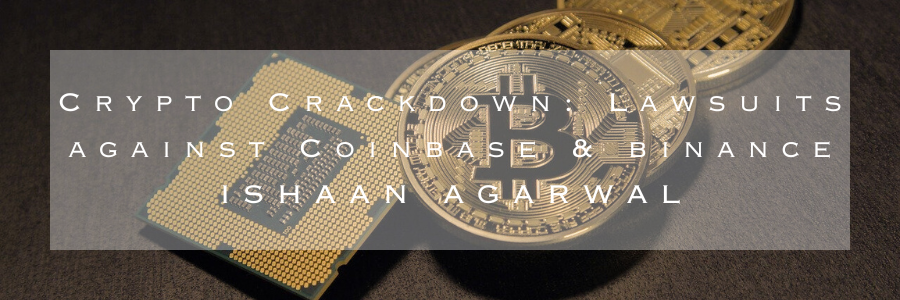My repository of thoughts on interesting ideas.
Crypto Crackdown: Lawsuits Against Coinbase and Binance

What are the Complaints?
The complaints against the U.S based crypto company, Coinbase allege that it flouts as an unregistered securities exchange offering unregistered securities in the form of a staking-as-a-service program. The SEC argues that this failure has deprived investors of federal protections to guard public interests.
The complaint against global exchange Binance included 13 charges, arguably more extensive than the Coinbase lawsuit. Similar to Coinbase, The SEC alleges that Binance has been operating as an unregistered securities exchange offering unregistered securities via various crypto assets–including BNB, BUSD, crypto lending products “Simple Earn” and “BNB Vault”– as well as a staking-as-a-service program. Beyond this, the company is accused of lying that BAM Trading, a U.S. affiliate, and Binance.US operated independently as a U.S. branch, and investors could not access the platform Binance.com. Supposedly, CEO Changpeng Zhao and Binance maintained influence over this U.S. branch and permitted and concealed high-profile investors’ access to Binance.com. Furthermore, the SEC complaint asserts that BAM Trading and Binance.US misled investors regarding the deceptive manipulation of asset trading volumes perpetrated by Sigma Chain, also owned by Zhao.
Points of Debate
A key point within these court battles may be the security status of cryptocurrencies. There is a possibility that legal counsels for both companies choose to argue that cryptocurrencies are commodities or currencies that fail to meet the criterion of the Howey Test. Depending on the point, it may determine whether the SEC’s jurisdiction expands to crypto or whether that responsibility belongs to the CFTC.
Mike Selig, an attorney, claimed in an interview with CoinDesk, “ Development companies and foundations associated with any of the crypto assets named in the lawsuits may be inclined to intervene to defend the non-security status of the crypto asset.”
Another issue may be the SEC’s lack of efforts to offer insight into its ideal regulatory objectives to companies in the crypto industry. This may allow counsels to benefit from the narrative that the SEC has been unclear regarding its expectations and their underlying justifications.
Brian Frye, another attorney in the same CoinDesk interview, argued, “I think Coinbase is much better situated. It has been trying to comply with the SEC’s rules for quite some time and the SEC has refused to even engage with Coinbase’s good faith efforts at compliance…Also, I think it is a problem that the SEC has still not provided an even remotely coherent explanation of what it wants to regulate, what it thinks it’s authorized to regulate, why it wants to regulate, how it wants to regulate, what it wants its regulations to achieve or really literally anything.”
Why Now?
Gensler’s crackdown on cryptocurrency exchanges follows a series of significant scams and scandals in the industry. One of the most notable scandals, in which $8bn was reported missing, was that of FTX, another cryptocurrency exchange that operated a crypto hedge fund, and its CEO Sam Bankman-Fried. Following litigation initiated by the SEC, the company ultimately went bankrupt, sending shockwaves through the industry. Such catastrophes have enlightened the public on the lack of oversight and the need for a regulated market structure. This has gradually killed the hype behind cryptocurrency and DeFi. The SEC’s actions this week are increasing the urgency and necessity for Congress to act to pass comprehensive legislation into place, especially if it wants to discourage businesses from offshoring and embracing foreign jurisdictions with new, clear regulations.
Industry Implications
Should the complaints stand up in court, it is a genuine possibility for Binance to cease operations in the U.S.
Molly White, a crypto critic and researcher who writes about cryptocurrency scandals and scams on her site Web3 Is Going Just Great, says, “The business model of cryptocurrency in general and cryptocurrency platforms really relies on not abiding by the regulations that are in place.” This suggests that if the SEC emerges triumphant, numerous companies unwilling or unable to profitably fit themselves into a potential regulatory framework will be forced to relocate. However, for Coinbase, given its attempts at compliance, despite misbehavior on the SEC’s side, such an outcome is less likely.
Regardless of the repercussions for these two companies, the implications for the DeFi ecosystem are profound. Arguably, these legal conflicts will inhibit innovation and growth of DeFi projects within this space as institutional backing for cryptocurrencies, market accessibility, and talent decrease within the U.S. market. The increased regulation that will likely result from Gensler’s pursuits will significantly influence the destiny of DeFi. As such, regulators must find the balance between law and decentralization to capitalize on the powers of DeFi and usher in a new era of improved finance.
Conclusion
The outcome of the lawsuits against Coinbase and Binance will have an impact on the future of cryptocurrency regulation in the US. The entire nation will watch as the government and these two companies battle for the future of cryptocurrencies.



